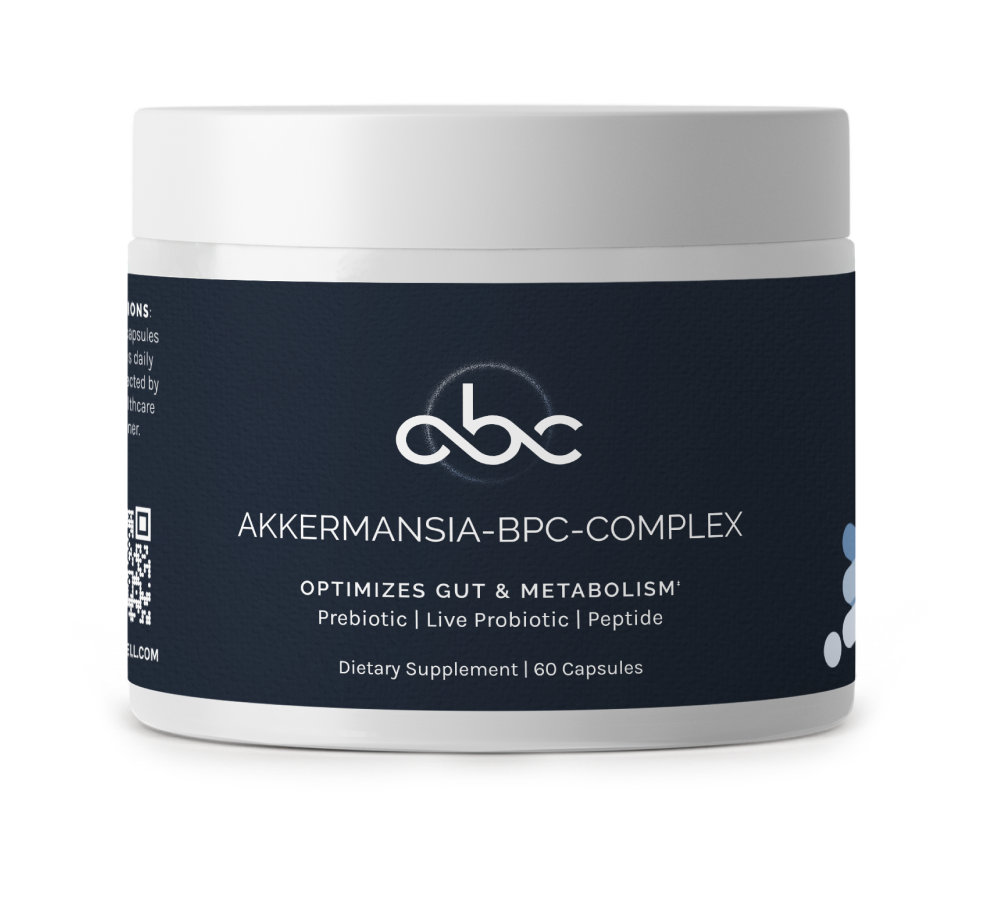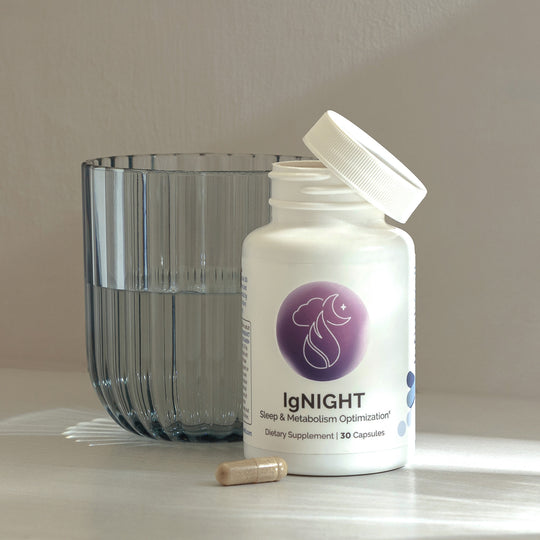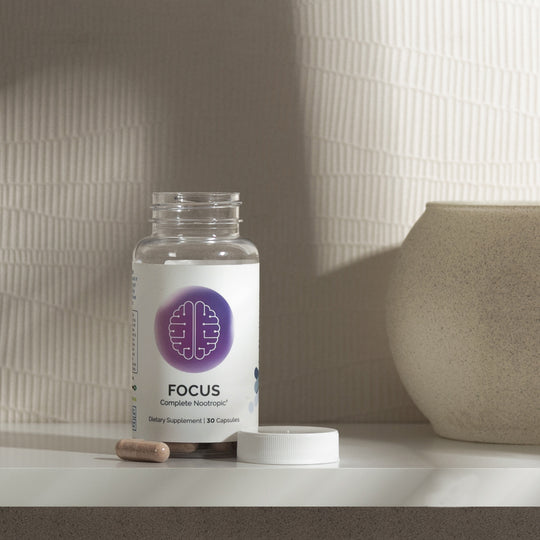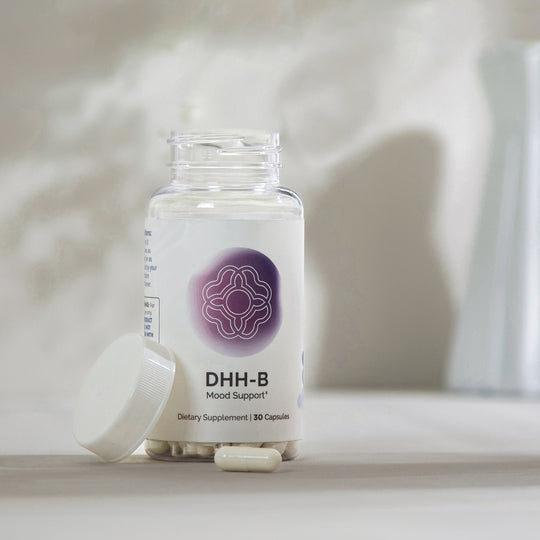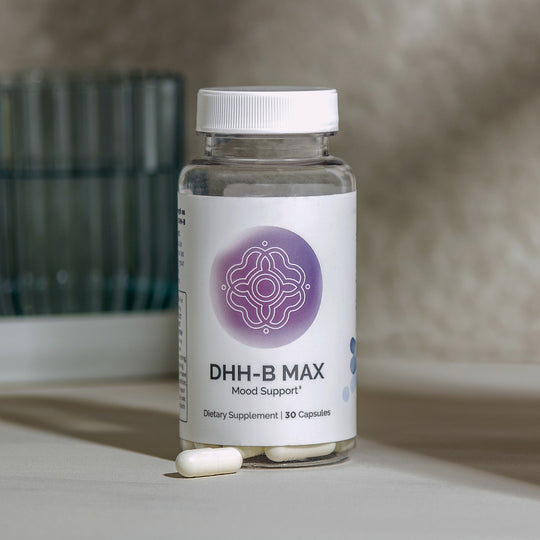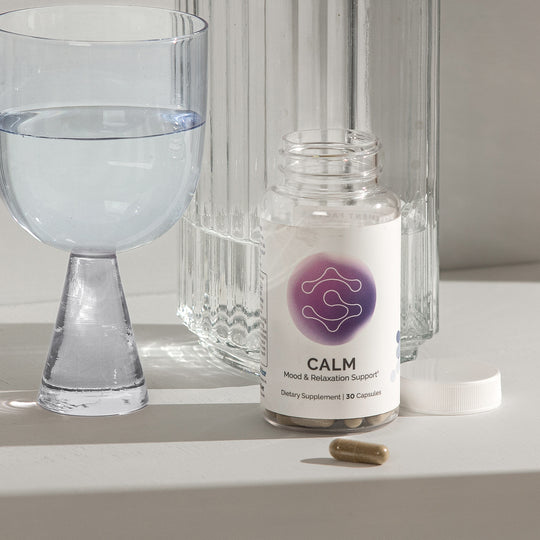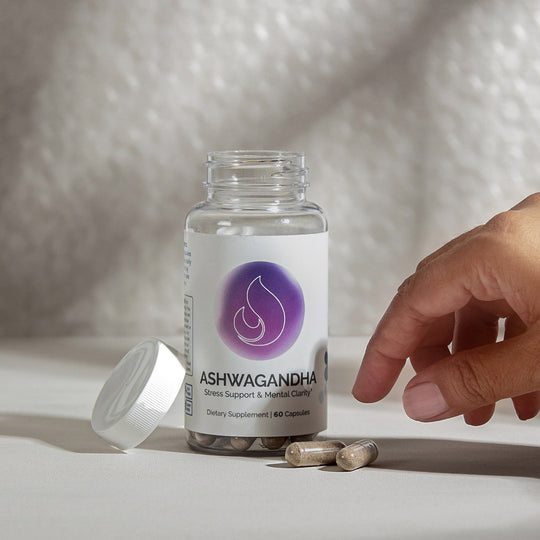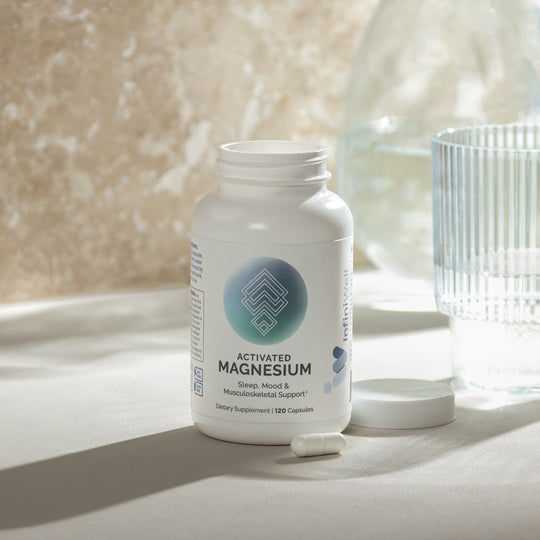ACTIVATED MAGNESIUM
Sleep, Mood & Musculoskeletal Support*
- Supports Healthy Neurotransmitter Metabolism
- Promotes Vascular Relaxation & Pliability
- Maintains Healthy Levels of Melatonin
- Aids in Healthy Levels of ATP Production
Active Ingredients: Magnesium, Malic Acid
Other Ingredients: Rice Powder, Hydroxypropyl Methycellulose, Magnesium Stearate, Silicon Dioxide, Vegetable Capsule (Hypromellose, Titanium Dioxide)
Take 2 capsules daily or as directed by your healthcare provider
Daily
2 Capsules
Akkermansia
Prebiotic | Live Probiotic*
- Supports GLP-1 Production
- Promotes Metabolic Efficiency
- Aids in Optimizing Gut Barrier Integrity
- Promotes Leaner Body Composition
Active Ingredients: Akkermansia (Live Akkermansia muciniphila), Sunfiber® Prebiotic (Galactomannan Fiber)
Other Ingredients: Vegetable Capsule (Hypromellose, Gellan Gum), Microcrystalline Cellulose, Magnesium Stearate
Take 1-2 capsules daily with water or as directed by your healthcare practitioner.
Daily
1-2 Capsules
ASHWAGANDHA
Stress Support and Mental Clarity*
- Promotes Hormonal Balance
- Supports Mental Clarity & Elevated Mood
- Facilitates An Optimal Environment For Normal Tissue Repair
- Optimizes Immune System Health
Active Ingredients: Ashwagandha, Black Pepper Extract
Other Ingredients: Vegetable Capsule (Hypromellose)
Take 2 capsules daily with water or as directed by your healthcare practitioner.
Daily
2 capsules
BPC-157 DELAYED - 250MCG
Muscle, Joint & Gut Support*
- Joint and Soft Tissue Support
- Promotes Digestive Function
- Neurological Support
- Optimizes Nitric Oxide Production
Active Ingredient: Body Protective Compound, Salcaprozate Sodium (SNAC)
Other Ingredients: Rice Powder, Microcrystalline Cellulose, Vegetable Capsule (Hypromellose, Gellan Gum)
Take 1 capsule twice daily or as directed by your healthcare practitioner.
Twice daily
1 Capsule
BPC-157 DELAYED PRO - 500MCG
Muscle, Joint & Gut Support*
- 60 Capsules
- 30 Capsules
- Joint and Soft Tissue Support
- Promotes Digestive Function
- Neurological Support
- Optimizes Nitric Oxide Production
Active Ingredient: Body Protective Compound, Salcaprozate Sodium (SNAC)
Other Ingredients: Rice Powder, Microcrystalline Cellulose, Vegetable Capsule (Hypromellose, Gellan Gum)
Take 1 capsule twice daily or as directed by your healthcare practitioner.
Twice daily
1 Capsule
BPC-157 Original - 250MCG
Muscle, Joint & Gut Support*
- Joint and Soft Tissue Support
- Promotes Digestive Function
- Neurological Support
- Optimizes Nitric Oxide Production
Active Ingredient: Body Protective Compound
Other Ingredients: Other Ingredients: Rice Powder, Microcrystalline Cellulose, Vegetable Capsule (Hypromellose)
Take 1 capsule twice daily or as directed by your healthcare practitioner.
Twice daily
1 Capsule
BPC-157 PRO TABLETS - 500MCG
Muscle, Joint & Gut Support*
- Joint and Soft Tissue Support
- Promotes Digestive Function
- Neurological Support
- Optimizes Nitric Oxide Production
Active Ingredient: Body Protective Compound, Salcaprozate Sodium (SNAC)
Other Ingredients: Calcium Carbonate, Microcrystalline Cellulose, Stearic Acid, Croscarmellose Sodium, Magnesium Stearate, Silicon Dioxide
Take 1 tablet twice daily or as directed by your healthcare practitioner.
Twice daily
1 Tablet
BPC-157 Probiotic | ABC
Peptide | Live Probiotic*
- Supports Healthy Gut Microbiota
- Aids in Optimizing Gut Barrier Integrity
- Helps Promote GLP-1 Production
- Promotes Leaner Body Composition
Active Ingredients: Akkermansia (Live Akkermansia muciniphila), Body Protective Compound 250mcg (as BPC-157 Arginate Salt), Sunfiber® Prebiotic (Galactomannan Fiber), Salcaprozate Sodium (SNAC)
Other Ingredients: Vegetable Capsule (Hypromellose, Gellan Gum), Microcrystalline Cellulose, Magnesium Stearate
Take 1-2 capsules two times daily with water or as directed by your healthcare practitioner.
Daily
1-2 Capsules
BPC-157 RAPID - 250MCG
Muscle, Joint & Gut Support*
- Joint and Soft Tissue Support
- Promotes Digestive Function
- Neurological Support
- Optimizes Nitric Oxide Production
Active Ingredient: Body Protective Compound, Salcaprozate Sodium (SNAC)
Other Ingredients: Rice Powder, Microcrystalline Cellulose, Vegetable Capsule (Hypromellose)
Take 1 capsule twice daily or as directed by your healthcare practitioner.
Twice daily
1 Capsule
BPC-157 RAPID PRO - 500MCG
Muscle, Joint & Gut Support*
- 60 Capsules
- 30 Capsules
- Joint and Soft Tissue Support
- Promotes Digestive Function
- Neurological Support
- Optimizes Nitric Oxide Production
Active Ingredient: Body Protective Compound, Salcaprozate Sodium (SNAC)
Other Ingredients: Rice Powder, Microcrystalline Cellulose, Vegetable Capsule (Hypromellose)
Take 1 capsule twice daily or as directed by your healthcare practitioner.
Twice daily
1 Capsule
BPC-157 Smart Chocolate
BPC-157 & Cognizin®*
- Supports Healthy Overall Brain Function
- Aids in Alertness, Focus and Attention
- Promotes Brain DNA Synthesis and Repair
- Maintains An Optimal Gut/Brain Axis
Body Protective Compound 250mcg (as BPC-157 Arginate Salt), Cognizin® Citicoline
Other ingredients: Cocoa Liquor, Cocoa butter, Sunflower Lecithin, Natural Cherry Flavor WONTF
Enjoy 1 smart chocolate daily or as directed by your healthcare practitioner.
Daily
1 smart chocolate
BPC-157 TABLETS - 250MCG
Muscle, Joint & Gut Support*
- Joint and Soft Tissue Support
- Promotes Digestive Function
- Neurological Support
- Optimizes Nitric Oxide Production
Active Ingredient: Body Protective Compound, Salcaprozate Sodium (SNAC)
Other Ingredients: Calcium Carbonate, Microcrystalline Cellulose, Stearic Acid, Croscarmellose Sodium, Magnesium Stearate, Silicon Dioxide
Take 1 tablet twice daily or as directed by your healthcare practitioner.
Twice daily
1 Tablet
CALM
Tranquility, Focus, and Cognitive Vitality*
- Promotes Relaxation & Stress Reduction
- Aids Improved Mood & Mood Stabilization
- Supports Neurological Health
- Supports Cognitive Performance
Active Ingredients: DHH-B (Dihydrohonokiol-B), L-TeaActive® (L-Theanine), BaCognize® (Bacopa monnieri)
Other Ingredients: Rice Powder, NuMag, NuFlow, Vegetable Capsule (Hypromellose)
Take 1 capsule as needed or as directed by your healthcare practitioner.
As needed
1 Capsule
SHOULD NOT BE TAKEN WITH ALCOHOL
CARDIO PRIME+
Advanced Cardiometabolic Support*
- Supports Vessel Health & Pliability
- Aids in Blood Pressure Regulation
- Supports Fibrinolytic Activity
- Maintains Already Healthy Cholesterol Levels
- Promotes Healthy Blood Sugar & Insulin Metabolism
Active Ingredients: Niacin, Copper, NAD3® Proprietary Blend (Wasabi Extract, Theacrine, Cuprous Niacin), Lactotripeptides, VasoDrive AP®, Citrus Bergamot Extract, CurcuPrime® Tetrahydrocurcumin, NSK-SD® Nattokinase
Other Ingredients: Microcrystalline Cellulose, Magnesium Stearate (Vegetable), Silica, Vegetable Capsule (Hypromellose). Contains soy and milk.
Take 2 capsules daily with water or as directed by your healthcare practitioner.
Daily
2 Capsules
CARDIOVASCULAR
Advanced Cardiometabolic Support*
- Supports vessel health & pliability
- Aids in blood pressure regulation
- Supports fibrinolytic activity
- Maintains already healthy cholesterol levels
- Promotes healthy blood sugar & insulin metabolism
- Cardio Prime+
- Green Tea
- CoQ10
Take 1 packet daily, in the morning on an empty stomach at least 1 hour before a meal, or as directed by your healthcare practitioner.
Daily
1 Packet
CONTROL
Glucose Metabolism & Insulin Sensitivity*
- Encourages Calorie Burn
- Promotes Leaner Body Composition
- Helps Regulate Metabolism
- Supports Healthy Blood Glucose Levels
- Assists in Preventing Weight Re-gain
- Reinforces Carbohydrate Tolerance
Active Ingredients: MitoBurn® (B-aminoisobuytric acid, L-BAIBA), Factor21® Bitter Melon Extract (Momordica charantia), Berberine HCL, GlucoVantage® (Dihydroberberine), InnoSlim® (Astragalus membranaceus and Panax notoginseng) Root Extracts, Actiponin® gynostemma pentaphyllum extract, CaloriBurn GP® Grains of Paradise seed extract
Other Ingredients: Vegetable Capsule (Hypromellose, Gellan Gum), Rice Powder, Microcrystalline Cellulose
Take 3 capsules daily or as directed by your healthcare practitioner.
Daily
3 Capsules
CoQ10
Cellular Energy Production*
- Supports Cardiovascular Health
- Boosts Antioxidant Activity
- Promotes Neurological Health
- Maintains Healthy Blood Sugar Balance
- Enhanced Cellular Energy and Physical Performance
Active Ingredients: Coenzyme Q10
Other Ingredients: Microcrystalline Cellulose, Magnesium Stearate, Silicon Dioxide, Vegetable Capsule (Hypromellose)
Take 1 capsule daily or as directed by your healthcare provider
Daily
1 Capsule
DEFEND
Foundational Combination of Vitamins A, D, & K2*
- Supports Healthy Calcium Deposition in Bones & Teeth
- Promotes Broad Immune System Activation
- Supports Healthy Levels of Oxidation within Blood Vessels
- Aids in the Metabolism of Lipids
Active Ingredients: Vitamin A, Vitamin D, Vitamin E, Vitamin K2 MK-7, AstraGin® (Astragalus membranaceus and Panax notoginseng) Root Extracts
Other Ingredients: Nuflow, Vegetable Capsule (Hypromellose)
Take 1 capsule daily or as directed by your healthcare practitioner.
Daily
1 Capsule
DEFEND PRO
Foundational Combination of Vitamins A, D, & K2*
- Supports Healthy Calcium Deposition in Bones & Teeth
- Promotes Broad Immune System Activation
- Supports Healthy Levels of Oxidation within Blood Vessels
- Aids in the Metabolism of Lipids
Active Ingredients: Vitamin A, Vitamin D, Vitamin E, Vitamin K2 MK-7, AstraGin® (Astragalus membranaceus and Panax notoginseng) Root Extracts
Other Ingredients: Nuflow, Vegetable Capsule (Hypromellose)
Take 1 capsule daily or as directed by your healthcare practitioner.
Daily
1 Capsule
DHH-B
Mood Support*
- Promotes an Overall Sense of Calm
- Helps Promote Relaxation & Reduced Nervousness
- Maintains Healthy Neurotransmitter Release (Specifically, GABA)
- Promotes Both Healthy REM & Non-REM Sleep Cycles
Active Ingredient: DHH-B (Dihydrohonokiol-B)
Other Ingredients: Cellulose, Rice Powder, Hydroxypropyl Methylcellulose, Magnesium Stearate, Silicon Dioxide, Vegetable Capsule (Hypromellose, Titanium Dioxide)
Take 1 capsule as needed or as directed by your healthcare practitioner.
As needed
1 Capsule
SHOULD NOT BE TAKEN WITH ALCOHOL.
DHH-B MAX
Mood Support*
- Promotes an Overall Sense of Calm
- Helps Promote Relaxation & Reduced Nervousness
- Maintains Healthy Neurotransmitter Release (Specifically, GABA)
- Promotes Both Healthy REM & Non-REM Sleep Cycles
Active Ingredient: DHH-B (Dihydrohonokiol-B)
Other Ingredients: Cellulose, Rice Powder, Hydroxypropyl Methylcellulose, Magnesium Stearate, Silicon Dioxide, Vegetable Capsule (Hypromellose, Titanium Dioxide)
Take 1 capsule as needed or as directed by your healthcare practitioner.
As needed
1 Capsule
SHOULD NOT BE TAKEN WITH ALCOHOL.
DIM
Hormone Support & Detoxification*
- Supports Healthy Estrogen Metabolism
- Promotes Leaner Body Composition
- Aids Liver Detoxification
- Supports Antioxidant Capacity
Active Ingredients: DIM (Diindolylmethane)
Other Ingredients: Microcrystalline Cellulose, Magnesium Stearate, Silicon Dioxide, Vegetable Capsule (Hypromellose, Titanium Dioxide)
Take 2 capsules daily with water or as directed by your healthcare practitioner.
Daily
2 Capsules
DNA PRIME
Cellular Protection & Telomere Support*
- Supports telomere length and telomerase activity
- Supports DNA repair and cellular renewal
- Promotes mitochondrial function
- Aids in the mitigation of oxidative stress
Active Ingredients: ac-11® Cat's Claw Aqueous Extract (Uncaria tomentosa), Activated BroccoRaphanin® (Broccoli concentrate from seed and myrosinase enzyme), Sulforaphane Glucosinolate (as Glucoraphanin), Buckwheat Peptides 20:1, 2-HOBA (Hobamine®), L-Ergothioneine (as MitoPrime®)
Other Ingredients: Microcrystalline Cellulose, Magnesium Stearate (Vegetable), Silica, Vegetable Capsule (Hypromellose)
Take 2 capsules daily or as directed by your healthcare practitioner.
Daily
2 Capsules
DUO
Hair Nourishment*
- Supports Follicular Proliferation & Differentiation
- Promotes Growth Factors Involved in Hair Growth & Maintenance
- Aids the Nourishment & Health of Hair Follicles
- Supports the Structure & Strength of Hair Strands
This advanced formula harnesses the power of two key ingredients: GHK-Cu and Zn-Thymulin. This physician formulated serum is fast-absorbing and aims to produce visible results in less than 30 days. Together, GHK-Cu and Zn-Thymulin work synergistically to enhance ongoing nourishment and revitalization of the scalp, promoting the visible appearance of thick, lustrous hair.
Apply evenly to affected areas of scalp once daily. Avoid contact with eyes.
Daily
Apply evenly to affected areas of scalp.
ENHANCE
Healthspan & Longevity Support*
- Promotes Longevity, Cellular Renewal & Autophagy
- Supports Heart Health & Mitochondrial Free Radicals
- Assists Cellular Detox & Optimizes Nrf2 Pathways
- Supports Stamina + Endurance & Protein Synthesis
- Maintains Lipid & Blood Sugar Regulation + Energy Production
Active Ingredients: Arginine Alpha-Ketoglutarate, Trimethylglycine, Bergamot Orange Extract, Bergamonte®, Epigallocatechin Gallate, Taxifolin, Spermidine
Other Ingredients: Vegetable Capsule (Hypromellose, Titanium Dioxide)
Take 3 capsules daily with water or as directed by your healthcare practitioner.
Daily
3 Capsules
EPICATECHIN
Cardiovascular Support & Muscle Function*
- Strength Gains
- Stamina & Endurance
- Nitric Oxide Support
- Antioxidant & Metabolic Support
- Muscle Protein Synthesis & Muscle Recovery
Active Ingredient: Epicatechin
Other Ingredients: Vegetable Capsule (Hypromellose, Titanium Dioxide)
Take 2 capsules daily with water or as directed by your healthcare practitioner.
Daily
2 Capsules
FOCUS
Breakthrough Nootropic For Everyone*
- Optimized Neurological Processing and Function
- Sustained Mental Acuity and Recall
- Short & Long Term Brain / Working Memory Support
- Blue Light Protection from Digital Devices
Active Ingredients: RhodioPrime® 6X Rhodiola - Rhodiola rosea, LuteMax2020 - Lutein and zeaxanthin, InnovaTea® - Caffeine, DynamineTM - methylliberine, TeaCrine® - Theacrine, Huperzine A
Other Ingredients: Vegetable Capsule (Hypromellose, Gellan Gum), Rice Powder, Microcrystalline Cellulose
Take 1 capsule in the morning with water or as directed by your healthcare practitioner.
As needed
1 Capsule
FOUNDATIONAL
Foundational Combination of Nutrients
- FOUNDATIONAL
- FOUNDATIONAL+
- Supports Immune Function & Immune Cell Activation
- Supports Strong Bones, Calcium Absorption & Metabolism
- Supports Cardiovascular Function
- Supports Neurological Function & Methylation Optimization
- Defend / Defend Pro
- Activated Magnesium
- Methylated B-Complex
- Omega 5x
Take 1 packet daily, with a meal, or as directed by your healthcare practitioner.
Daily
1 Packet
GHK-CU
Skin Hydration & Nourishment*
- Aids Reduced Muscle Activity Leading to Wrinkles & Fine Lines
- Supports Healthy Levels of Elastin, Proteoglycans, & Glycosaminoglycans
- Promotes Healthy Collagen Synthesis
GHK-Cu was formulated to help provide a reduced appearance of wrinkles and fine lines. GHK-Cu works into the skin easily, with a smooth finish on the skin.
Apply 4 pumps to face (or desired area) once daily. Avoid contact with eyes.
Daily
4 Pumps
GI PRIME
Comprehensive Pre/Pro/Post Biotic Formula*
- Supports a Healthy Gut Microbiota
- Strengthens Immune System
- Aids in Optimizing Gut Barrier Integrity
- Modulates Immune Response in the Gut via Activation of pDC’s
- Supports Digestive Function & Regularity
Active Ingredients: Dried Yeast Fermentate (EpiCor®) (Saccharomyces cerevisiae), Lactococcus lactis strain Plasma (IMMUSE™ Paraprobiotic), ButyraGen™, Spore Probiotic Blend - Bacillus Coagulans (SNZ 1969), Bacillus Subtillus (SNZ 1972), Bacillus Clausii (SNZ 1971)
Other Ingredients: Vegetable Capsule (Hypromellose), Rice Powder, Microcrystalline Cellulose, Magnesium Stearate, Silicon Dioxide.
Take 3 capsules daily or as directed by your healthcare practitioner.
Daily
3 Capsules
GLYNAC
Elevate Health through Glycine & NAC*
- Supports Antioxidant Capacity
- Supports Glutathione Synthesis
- Promotes Mitochondrial Function
- Aids in Nutrient Sensing
Active Ingredients: Glycine, N-Acetyl L-Cysteine
Other Ingredients: Vegetable Capsule (Hypromellose), Rice Powder, Magnesium Stearate, Silicon Dioxide.
Take 2 capsules with water daily or as directed by your healthcare practitioner.
Daily
2 Capsules
HRT SUPPORT
Hormone Support & Detoxification*
- HRT SUPPORT
- HRT SUPPORT+
- Supports Sex Hormone Metabolism Through Phase 1 Detoxification
- Supports Immune Function & Immune Cell Activation
- Supports Strong Bones, Calcium Absorption & Metabolism
- Supports Cardiovascular Function
- Supports Neurological Function & Methylation Optimization
- Diindolylmethane
- Defend / Defend Pro
- Activated Magnesium
- Methylated B-Complex
- Omega 5X
Take 1 packet daily, with a meal, or as directed by your healthcare practitioner.
Daily
1 Packet
IGNIGHT
The Key to Optimal Sleep & Metabolic Health*
- Increases Restorative Sleep
- Supports High Quality Sleep
- Encourages Calorie Burn
- Promotes Leaner Body Composition
Active Ingredients: Sleeproot ValerianTM - Valeriana officialis, Shoden® Ashwagandha, Dihydrohonokiol-B (DHH-B), CaloriBurn GP®
Other Ingredients: Vegetable Capsule (Hypromellose), Rice Powder, Magnesium Stearate, Silicon Dioxide.
Take 1 capsule 30 mins before bed or as directed by your healthcare practitioner.
30 Minutes before bed as needed
1 Capsule
SHOULD NOT BE TAKEN WITH ALCOHOL.
Immune Shield
- Supports Immune Function & Immune Cell Activation
- Modulates Immune Response in the Gut via Activation of pDC's
- Aids in Optimizing Gut Barrier Integrity
- Supports Heart Health & Mitochondrial Free Radicals
- Defend Pro
- GI Prime
- Enhance
Take 1 packet daily, with a meal, or as directed by your healthcare practitioner.
Daily
1 Packet
InfiniAge™
OMICm Age & Pace of Aging Optimization*
- Aids Antioxidant Capacity
- Promotes Cholesterol Profiling
- Optimizes Nutrient Sensing Pathways
- Optimizes Mitochondrial Function
- Supports Cognitive Function & Brain Aging
Active Ingredients: Zinc, Calcium, N-Acetyl L-Cyteine, Lutein, Eclipse Bio-Age Complex (Calcium alpha-ketoglutarate, Uridine monophosphate, L-Ergothioneine, Chokeberry Extract)
Other Ingredients: Magnesium Stearate, Silicon Dioxide, Vegetable Capsule (Hypromellose)
Take 2 capsules daily or as directed by your healthcare practitioner.
Daily
2 Capsules
LONGEVITY
Cellular Protection & Telomere Support*
- LONGEVITY
- LONGEVITY+
- Promotes Longevity & Cellular Renewal
- Supports Stamina/Endurance & Protein Synthesis
- Supports Heart Health & Mitochondrial Function
- Maintains Lipid metabolism & Energy Production
- NMN
- Senolytic
- Senescent Regulator
- DNA Prime
- Enhance
Take 1 packet daily, in the morning on an empty stomach at least 1 hour before a meal, or as directed by your healthcare practitioner.
Daily
1 Packet
METABOLIC ACTIVATOR
Glucose Metabolism & Insulin Sensitivity*
- Optimized Metabolism, Microbiome & GLP-1 Support
- Body Composition & Conversion of White to Brown Fat
- Insulin Sensitivity Support & FGF21 Activation
- Metabolic, Blood Sugar & AMPK Support
- Promotes Beta Cell Function
- Senolytic
- Control
- GI Prime
Take 1 packet daily, with a meal, or as directed by your healthcare practitioner.
Daily
1 Packet
METHYLATED B-COMPLEX
High Potency, Comprehensive B-Complex*
- Supports Healthy Methylation & Carbohydrate Metabolism
- Promotes Nervous System, Immune & Adrenal Health
- Supports Neurotransmitter Production For A Positive Mood
- Protects Against Stress-Induced Nutrient Depletion
Active Ingredients: Thiamine (Vitamin B1), Riboflavin (Vitamin B2), Niacin, Vitamin B6, Folate, Vitamin B12, Biotin, Pantothenic Acid, Choline Bitartrate, Inositol
Other Ingredients: Hydroxypropyl Methycellulose, Magnesium Stearate, Silicon Dioxide, Vegetable Capsule (Hypromellose)
Take 1 capsule daily or as directed by your healthcare practitioner.
Daily
1 Capsule
NMN
The Vanguard of Anti-Aging Science*
- Supports NAD+ Production
- Promotes Longevity & Healthy Aging
- Helps Maintain Healthy DNA & Epigenetic Function
Active Ingredients: Nicotinamide Mononucleotide, Resveratrol, Pterostilbene
Other Ingredients: Hypromellose, Titanium Dioxide
Take 2 capsules daily with water or as directed by your healthcare practitioner.
Daily
2 Capsules
OMEGA 5x
Unlock the Therapeutic Potential of Omega-3*
- Contains Bioavailability Enhancement of Up to 5X vs. Conventional Fish Oil
- Supports Various Aspects of Cardiometabolic Health
- Facilitates Utilization of All Omega Fatty Acids in the Diet
- Supports Healthy Levels of Inflammation throughout the Body
Active Ingredients: Omega-3 Lysine Complex, SmartPrime-Om™ Complex, AstraGin® Root Extracts
Other Ingredients: Magnesium Stearate, Silica, Hypromellose. Contains Fish.
Take 2 capsules with water daily or as directed by your healthcare practitioner.
Daily
2 Capsules
Contains fish
PTD-DBM
Hair Restoration and Growth*
- Supports the Wnt/β-catenin Signaling Pathway
- Supports Follicular Proliferation & Differentiation
- Aids the Integrity & Strength of the Hair Structure Itself
- Promotes Growth Factors Involved in Hair Follicle Development
PTD-DBM, a breakthrough peptide, is combined with Methyl Vanillate, a natural compound derived from vanillin, both of which are vital for optimizing the environment for hair growth. With their powerful mechanisms of action and easy, fast-absorbing topical application, PTD-DBM and Methyl Vanillate offer the ideal solution for those seeking novel, effective ways to jumpstart their hair follicles and begin the journey toward visibly improving the appearance of full, thick hair. This physician formulated serum is fast-absorbing and aims to produce visible results in less than 30 days.
Apply evenly to affected areas of scalp once daily. Avoid contact with eyes.
Daily
As needed.
Avoid contact with eyes.
REPAIR & RECOVERY
Muscle, Joint, Gut-Brain Axis & Digestive Support*
- REPAIR & RECOVERY
- REPAIR & RECOVERY+
- Muscle Protein Synthesis & Recovery
- Strength Gains & Mitochondrial Neogenesis
- Mucosal Barrier Support & AMPK Activation
- Body Composition Support & Cortisol Regulation
- BPC-157
- Strength
- Ashwagandha
Take 1 packet daily with a meal, or as directed by your healthcare practitioner.
Daily
1 Packet
SENESCENT REGULATOR
Rejuvenation and Metabolic Regulation*
- Aids Body’s Process of Reusing Old & Damaged Cell Parts
- Supports Healthy mTOR Inhibition & AMPK Expression
- Promotes Healthy, Youthful Cellular Function
Active Ingredients: TumiPure Gold® Turmeric Extract, CurcuPrime® Tetrahydrocurcumin, Luteolin, Resveratrol, Pterostilbene
Other Ingredients: Vegetable Capsule (Hypromellose)
Take 2 capsules daily or as directed by your healthcare practitioner.
Daily
2 Capsules
SENOLYTIC
Optimize Cellular Aging*
- Supports Healthy Aging & Longevity
- Optimizes Neurological Processing & Function
- Supports SIRT1 & AMPK Activation
- Helps Maintain Healthy Levels of Senescent Cells
Active Ingredients: Fisetin, Querciten, Resveratrol, Pterostilbene, Curcumin
Other Ingredients: Hypromellose, Titanium Dioxide
Take 1 capsule daily with water or as directed by your healthcare practitioner.
Daily
1 Capsule
STRENGTH
Support For Muscle Mass & Tissue Quality*
- Muscle Protein Synthesis & Muscle Recovery
- Strength Gains
- Stamina & Endurance
- Body Composition
- Lipid Metabolism
- Enhanced Blood Flow
Active Ingredients: Calcium, myHMB® - B-Hydroxy B-Methylbutyrate, Epicatechin, PurpleForce® Purple Tea Leaf Extract, AstraGin® Root Extracts, Senactiv® Root Extracts
Other Ingredients: Rice Powder, Microcrystalline Cellulose, Hypromellose
Take 3 capsules daily with water or as directed by your healthcare practitioner.
Daily
3 Capsules
THYROID OPTIMIZER
Comprehensive Hormone Support*
- Thyroid Optimizer
- Thyroid Optimizer+
- Supports Healthy Thyroid Function
- Aids in the Synthesis of Thyroid Hormones
- Supports Cellular Sensitivity to Thyroid Hormones
- Helps Support Effective & Efficient Conversion of T4 to T3
- Promotes Healthy Antioxidant Capacity
- Thyroid Support / Thyroid Support+
- Ashwagandha
- Green Tea
Take 1 packet daily, in the morning on an empty stomach at least 1 hour before a meal, or as directed by your healthcare practitioner.
Daily
1 Packet
THYROID SUPPORT
Comprehensive Hormone Support*
- Supports Healthy Thyroid Function
- Aids in the Synthesis of Thyroid Hormones
- Supports Cellular Sensitivity to Thyroid Hormones
- Helps Support Effective and Efficient Conversion of T4 to T3
- Promotes a Healthy Inflammatory and Antioxidant Response
Active Ingredients: Selenium, Iodine, Vitamin K2, InfiniWell Blend (Hydroxytyrosol Acetate, Guggulsterone, Theobromine)
Other Ingredients: Microcrystalline Cellulose, Maltodextrin, Magnesium Stearate, Dicalcium Phosphate
Take 2 tablets in the morning or as directed by your healthcare practitioner.
Daily in the morning
2 Tablets
THYROID SUPPORT+
Comprehensive Hormone Support*
- Supports Healthy Thyroid Function
- Aids in the Synthesis of Thyroid Hormones
- Supports Cellular Sensitivity to Thyroid Hormones
- Helps Support Effective and Efficient Conversion of T4 to T3
- Promotes a Healthy Inflammatory and Antioxidant Response
Active Ingredients: Selenium, Iodine, Vitamin K2, Guggulsterone E-Z, Diiodo-L-Thyronine, InfiniWell Blend (Hydroxytyrosol Acetate, Theobromine)
Other Ingredients: Microcrystalline Cellulose, Maltodextrin, Magnesium Stearate, Dicalcium Phosphate
Take 2 tablets in the morning or as directed by your healthcare practitioner.
Daily in the morning
2 Tablets
TRIO
Synergistic Solution for Facial Wrinkling*
- Aids Reduced Muscle Activity Leading to Wrinkles & Fine Lines
- Supports Healthy Levels of Moisture & Hydration
- Supports Healthy Collagen & Elastin Production
The InfiniWell Trio cosmetic has been shown to work synergistically to reduce the appearance of the depth of wrinkles. Trio Cosmetic easily works into the skin, and goes on skin with a smooth finish.
Apply 4 pumps to face (or desired area) once daily. Avoid contact with eyes.
Daily
4 Pumps
Avoid contact with eyes.
Sleep & Mood
Sleep & Mood FAQs
-
Why is good sleep important?
Good sleep offers tremendous benefits:- Repairing tissues and muscles
- Consolidating memories and enhancing cognitive performance
- Reducing stress and anxiety
- Maintaining a strong immune function to fight off infections and illness
- Regulating hormones like cortisol, which affects metabolism and stress levels
- Preventing increased risk of heart problems
- Improving concentration, focus, and problem-solving abilities
Inadequate sleep, on the other hand, can disrupt bodily functions (e.g., metabolism, hormone regulation, and immune function), increase stress and anxiety, and raise the risk of chronic conditions like diabetes and heart disease.
Unfortunately, for many people, modern life makes it difficult to get enough restful sleep. Long work hours, everyday stressors, and constant connectivity can all impair sleep patterns.
-
What vitamins help with sleep?
If you're having trouble falling asleep, certain vitamins can help you get a good night's sleep and stay asleep longer:Vitamin D
- Helps regulate the sleep-wake cycle
Research suggests that low levels of vitamin D are linked to sleep disorders like insomnia and sleep issues like poor sleep quality, difficulty staying asleep, and shorter sleep duration.
Magnesium
- Has a calming effect on the nervous system, helping you relax and fall asleep faster
Activated magnesium also helps regulate melatonin, a hormone that guides your sleep-wake cycles.
Vitamin B6
- Aids in the production of serotonin and melatonin, which are both important for sleep
If you're not getting enough of these sleep vitamins from your diet, vitamin D, B6, and magnesium supplements may help you fall asleep faster and improve sleep quality.
Note that while vitamins for sleep can help, individual results may vary. If you continue to struggle with sleep, consult your doctor for further assessment and guidance.
-
How can I increase deep sleep?
Deep sleep is the most restorative stage of sleep, where the body strengthens the immune system and repairs tissues. During this stage, the body is most relaxed, and brain waves are slow and regular.Lack of deep sleep can lead to daytime sleepiness, irritability, and difficulty concentrating. Factors that can affect deep sleep include age, stress, sleep disorders, medications, and lifestyle factors like excessive alcohol intake.
To increase deep sleep:
- Stick to a sleep schedule: Follow a consistent sleep-wake schedule—every day, even during weekends—to regulate your body clock.
- Limit caffeine and heavy meals before bed: Skip large meals or stimulants like coffee close to bedtime—these can interfere with your ability to fall into deep sleep.
- Relax before bed: Try calming activities like meditation, reading, or taking a warm bath to signal to your body that it's time to wind down.
- Exercise regularly: Stay active during the day to promote deeper sleep, but avoid intense workouts close to bedtime.
- Make your bedroom sleep-friendly: Keep it cool, dark, and quiet. Comfortable bedding and a good mattress can also make a big difference.
- Try sleep supplements: Vegan sleep aid options like magnesium or DHH-B can help relax your body and deepen sleep.
-
What is a DHH-B supplement?
DHH-B, or dihydrohonokiol-B, is a naturally occurring compound found in magnolia bark and usually used in anxiety and sleep supplements. It's known for its calming and sedative effects, which help promote relaxation and better sleep. -
What are the effects of DHH-B?
DHH-B may help reduce anxiety, improve sleep quality, and calm the mind. It's considered a natural alternative to stronger prescription medications for sleep and mood regulation.Note, however, that while DHH-B is generally considered safe, always check with your doctor before starting any new supplement. They can provide guidance on:
- Dosage
- Potential interactions with other medications
- Whether DHH-B is suited for your needs
-
What is the best natural sleep aid?
Natural sleep aids can be a gentler and safer alternative to prescription sleep aids, offering relief without the potential for dependency or side effects. Some of the best natural sleep aids include:Melatonin
- A hormone that regulates the sleep-wake cycle
- Commonly used to reset sleep patterns, especially for those with insomnia or jet lag
Magnesium
- Can help calm the nervous system, relax the muscles, and improve sleep quality
Valerian root
- Often used as a herbal medicine for anxiety and insomnia
- May help you fall asleep faster
DHH-B
- Has calming properties
- Can function as a natural alternative to stronger sleep medications
Chamomile tea
- A popular mild sedative that can help you relax before bed
Prescription sleep aids are effective for short-term relief but may lead to side effects like dependency and drowsiness the following day. Meanwhile, vitamins that support sleep and dietary supplements like melatonin, magnesium, and DHH-B can promote better sleep without exposure to similar risks.
However, always consult your doctor before starting any supplement regimen.
-
How can I sleep through the night without melatonin?
If you prefer not to take melatonin supplements, there are several ways to sleep through the night.- Sleep and get up at the same time every day: This regulates the body's internal clock.
- Wind down before bedtime: Read, take a warm bath, or practice relaxation techniques.
- Limit screen time: Exposure to blue light from computers, phones, or TVs can disrupt melatonin production. Avoiding screens at least an hour before bed is ideal.
- Create a sleep area that's conducive to sleep: That means a bedroom that's dark, cool, and quiet.
- Reduce alcohol and caffeine intake: Caffeine can stay in your system for hours and disrupt sleep, while alcohol can cause fragmented sleep.
- Exercise regularly: Regular exercise can promote better, deeper sleep, but avoid vigorous exercise too close to bedtime.
- Consider alternative supplements: Melatonin alternatives can include magnesium, DHH-B, valerian root, and chamomile tea.
-
Is InfiniWell sleep aid safe to take every night?
InfiniWell supplements for sleep are designed for regular use. But always check with your healthcare provider if you plan to use them nightly for extended periods. -
What is a good alternative to melatonin?
Alternatives to melatonin include magnesium, valerian root, DHH-B, and chamomile. They're some of the best vitamins for sleep and anxiety, helping promote relaxation and better sleep without the potential side effects often associated with melatonin supplements. -
Is there a natural mood booster?
Yes, natural mood-boosting supplements like DHH-B, St. John's wort, and omega-3 fatty acids can help lift your mood and improve symptoms of anxiety or low energy.Note, however, that individual results may vary. Diet, exercise, and stress management also play a role in mood regulation. If you're struggling with severe anxiety or mood disorders, mood supplements should not be seen as a substitute for professional help.
-
What vitamin is a mood stabilizer?
Vitamin D, B vitamins, and omega-3 fatty acids are commonly used as mood stabilizers. They support brain health and can help manage feelings of anxiety and low mood.Vitamin D
Essential for various body functions, including mood regulation. Vitamin D deficiency can increase the risk of depression and anxiety.
B vitamins
Crucial for brain health and the production of neurotransmitters. Vitamin B deficiency, especially B12 and folate (B9), can contribute to mood disorders.
Omega-3 fatty acids
Essential for brain function and may help reduce inflammation, which is often linked to mood disorders like anxiety and depression.
-
How can I stimulate my mood?
To boost your mood naturally, consider taking mood supplements like DHH-B, omega-3 fatty acids, or B-complex vitamins. A healthy diet, regular exercise, and mindfulness practices can also help.Note that results can vary from person to person. If you're experiencing severe mood disorders, consult a healthcare professional for further assessment and a treatment plan designed for your individual needs.






